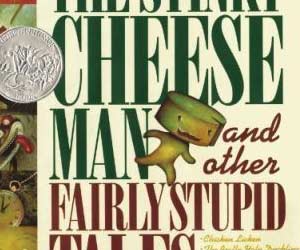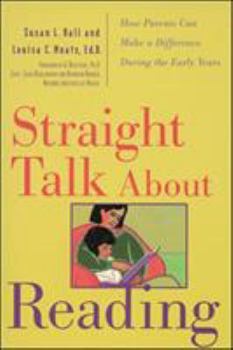Strght Tlk Abt Reading
Select Format
Select Condition 
Book Overview
Today's parents are increasingly concerned about the reading and spelling skills taught in schools and are taking charge of their children's education. Full of ideas and suggestions----from innovative... This description may be from another edition of this product.
Format:Paperback
Language:English
ISBN:0809228572
ISBN13:9780809228577
Release Date:January 1999
Publisher:McGraw-Hill Companies
Length:384 Pages
Weight:1.40 lbs.
Dimensions:1.0" x 5.9" x 9.2"
Related Subjects
Books & Reading Education Education & Reference Education Theory General Home Repair How-to & Home Improvements Humanities Language Experience Approach Literary Criticism Literary Criticism & Collections Literature Parent Participation Parenting & Relationships Reading Skills Schools & Teaching Textbooks Words, Language & GrammarCustomer Reviews
5 ratings
What can YOU do to help kids learn to read? Here's how.
Published by Thriftbooks.com User , 21 years ago
This book was truly spectacular if you are interested in really understanding how kids learn to read and what you can do to help! I learned so much from this book, if I had the money, I would buy a ton of them and give them out to anyone who has kids, will have kids, or works with kids. This book does an amazing job of developmentally (Pre-K through grade 3) describing the skills kids need to acquire in order to read. It fairly reviews the current debate on how kids need to be taught reading, what parents can do (tons of specific age appropriate activities & lists of good books based on reading level), and it describes the research based warning signs for a child who is at risk for reading difficulties.
Be proactive in your child's education!
Published by Thriftbooks.com User , 23 years ago
I am a teacher of children with mild to moderate specific learning disabilities who went through the teacher education program at Ashland University in Ohio. Like countless other teacher education programs, ours stressed only a "whole-language" model of instruction, to the exclusion of all others, especially those that stress explicit phonics instruction. I bought this book at a symposium given by the International Dyslexia Association, and I am so thankful that I did. As a parent of elementary school-age children I needed to know the things in this book. Specifically...*Why a book like this is necessary in the first place.*What is this "great debate" that reading teachers, and educators keep talking about?*How do children learn to read? Amazingly, this is not taught in many teacher education programs. Why? Because almost all of the research ever done on the issue, any research worth its weight in cotton candy points to the explicit teaching of phonics to be the way that most children learn to read. As the authors so beautifully, and succinctly point out "The English written code is a sound symbol code, not a word symbol code. That is the game."Parents of school-age children especially need to carefully read this book. Although I myself am a teacher, I believe in a "parent as consumer" focus in education, and, given this, caveat emptor! Parents need to know what they are getting in return for their hard earned tax dollars. Please email me if you would like to continue this discussion.
Parents Can and Need to be Part of Reading Education
Published by Thriftbooks.com User , 24 years ago
In today's world, reading is an essential component in a very competitive, highly technological society. More and more parents should be making efforts to advocate for quality reading programs in their schools. This book by Hall and Moats is a comprehensive guide for parents about current researched based practices in teaching reading. Susan Hall has traveled the road as a parent of a child who had difficulty learning to read. Louis Moats, Ed.D has extensive experience in the field of reading as an educator, researcher, consultant and writer. The book has been divided into three parts: 1. Background Information - all the information you need to make informed judgments and decisions about your child's reading instruction, whole language vs. phonics. 2. What Parents Can Do To Help Their Child - numerous explicit activities and games to support you child's progress in reading. 3. When Reading is Difficult - discussion about disabilities vs. poor instruction; learning disabilities and dyslexia.Like James Cunningham, these authors attempt to create an 'aha' moment with the reader by drawing analogies to other professions (e.g. physicians, lawyers, accountants) regarding consumer expectations for quality and know-how. "Best practices" in education as in other fields should not only be reasonable but mandatory. It is my belief that the Dept. of Ed. in MA is making attempts toward this through their recertification process. Though they can advocate and require accountability for performance, they cannot control how the individual school districts choose to implement these policies. "Children's needs shouldn't have to take a back seat to adult professional egos." All the more reason for parents to know, understand and advocate for `good instruction'. Limited resources are available geared toward the public about reading research which makes this book extremely valuable to parents. It's 'reader friendly' way to becomeacquainted with proven research based methods of reading instruction definitely creates 'aha' moments.The authors have skillfully used clear and concise charts throughout the book to highlight main points. They have also included a fascinating historical timeline of Reading Instruction from the 1700's-1997 which is sure to amuse, confuse, and enlighten the reader. As parents of school age children we need to be reminded that `just because we learned one way' doesn't necessarily mean it was the best way. The authors also tell the reader to BEWARE - "All that goes by the name of `phonics' is not equally effective." and take CAUTION when you hear - "balanced reading program." The 'buzzwords'- sequential, systematic, explicit are carefully defined and seven instructional components of a good reading curriculum are described in detail.Beyond creating more informed parents, four chapters have been written to empower the parent by providing detailed activities to do at home, benchmarks to gauge you
Parents don't have to accept mediocre reading education!
Published by Thriftbooks.com User , 25 years ago
Massachusetts fourth graders last year took a state-wide comprehensive assessment test (MCAS) and my first grader's school did particularly poorly in English Language Arts. Being a concerned parent, I wanted to arm myself with information about reading/literacy educational methods so I could help improve the teaching going on at the school. While my child already seems to be reading at a high level, I don't want to wait until fourth grade to get an objective assessment and I DO want to provide her an education which allows her to excel. This is the perfect book for parents who want to help their children to read and help their school to do better in reading instruction. It decodes edu-babble and provides information that can make you an effective change agent for your school. I particularly liked the sections on:* Background on the differences between whole language and phonics approaches. * A detailed account of the tribulations of reading instruction in California (for all my CA friends) * Ways to determine if your child's teacher is using effective teaching practices. * Benchmark lists to see whether your child is "on track". * A list of warning signs for reading difficulty. * Lists of recommended books scaled by reading difficulty.I highly recommend this book!
This book is a must-read for parents and educators
Published by Thriftbooks.com User , 25 years ago
Reid Lyon's introduction to this book provides a clear description of this helpful resource: "It is unusual that a book about reading written for parents can be informative, understandable, and true to the scientific basis for understanding reading. To my knowledge, this book is the first of its kind. The scientific research in reading has progressed to the level that dissemination of critical findings to a child's most important teacher-the parents-is not only possible but imperative.....Mrs. Hall, whose own child experienced reading difficulty in first grade, and Dr. Moats, a reading scientist and teacher educator, combine their wisdom and knowledge to produce a readable, informative, accurate, and above all, practical resource for parents."Reading through Hall and Moats' book, I was impressed not only by its clear readability, but how adeptly the authors wrote about complex issues associated with reading instruction in such an interesting, attention-holding manner. This latest book on reading is not only helpful for parents, but would also be informative and hold the interest of any elementary education teacher or principal. Especially helpful and unique to this book is Hall's differentiation of the needs of the regular learner as contrasted with the needs of the student with learning disabilities. The first part of Hall and Moat's book details the larger picture of America's Reading Crisis along with theory and research behind whole language and explicit phonics. Interspersed among these issues is the echoing theme of Hall and Moat's that "teaching a child to read is a shared responsibility between school and parents." The responsible parent as described throughout this book is not just a bake sale parent who reads aloud to his or her child at home, but rather an informed, proactive consumer who assumes the role of COACH at home, who MONITORS his/her child's reading development against benchmarks, and who ADVOCATES if reading development at school is not on track. Information provided throughout this book is designed to help the parent develop skills in those three areas. I found the specific tips and strategies for reading aloud and conversing to children at different stages between 6-9 months, 12-18 months, 2 years of age, and 6-8 years of age practical and well summarized. I always felt as if I had an advantage with my own children after working for so many years with speech and language pathologists because I picked up on so many little tips for natural learning that can be engendered with younger children. Many of those types of tips are presented here. Moving past this point, the reader soon is introduced to all of the issues behind phonics instruction, phonological skill development, and stages of reading development. Armed with this information, the reader will know whether a specific reading program is phonics or whole language based; whether the phonics is taught well, and how to s
Straight Talk About Reading : How Parents Can Make a Difference During the Early Years Mentions in Our Blog

30 Books Your Family Can Enjoy Together This Thanksreading
Published by Beth Clark • November 07, 2018
Between Movember, Thanksgiving, Black Friday, and a cornucopia of other observances and celebrations, November is busy. Which makes causes like Family Literacy Month tempting to skim or even skip. Enter Thanksreading, invented as a way to connect the random dots and promote our favorite thing ever (ahem, besides our stellar customers), BOOKS! Big, small, square, and tall…we have them all. Below are 30 titles handpicked with love for newborns to centenarians, and everyone in between, because families that read together succeed together, and holidays are all about hanging with the ones you love. (And about food—so much food—but that's a separate blog.)





